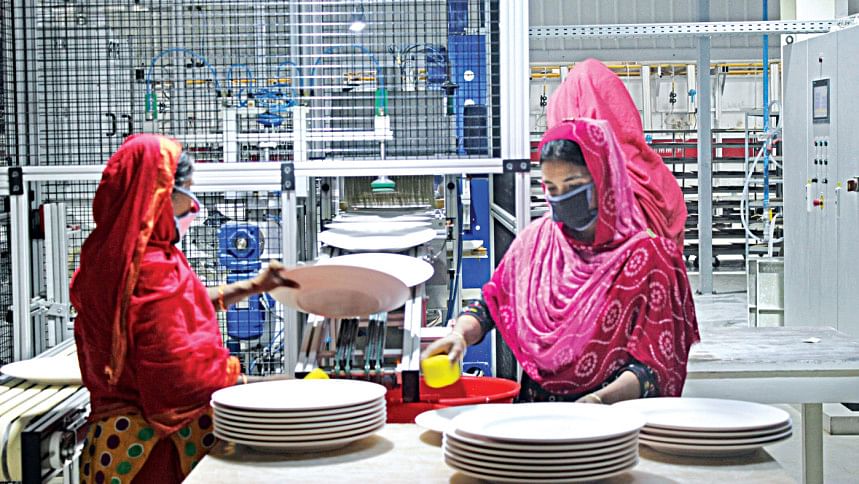Akij Tableware aims to be a product of choice


It has been a decade Akij Ceramics Ltd, a concern of Akij Group, has been operating in the ceramic industry in Bangladesh.
A well-known producer of tiles, the firm's growing popularity was reflected after it became the best brand for three consecutive years to 2021. It is now the second-biggest tiles maker in the country in terms of sales and production.
Buoyed by the initial success, the company has recently introduced tableware to tap the growing demand for quality crockeries of ceramics among the fast expanding middle class and well-off consumers as well as to explore the global market.
"As per capita income is growing dynamically, the opportunity is also growing dynamically," SK Bashir Uddin, managing director of Akij Group, told The Daily Star in an interview recently.
"Once you achieve certain standards, the whole world is yours. We believe that the category itself and the demand out there in the world will generate business that we are looking forward to."
Bashir firmly believes that the company will be able to contribute to the sector.
"First, we will export. Second, we will substitute imports."
Akij Ceramics has so far invested more than Tk 1,000 crore in its ceramics plant since it started operation in 2012. For tableware, it invested more than Tk 200 crore in order to meet the growing demand for quality products now met through imports.
"Clearly, there is a sizeable upper middle class aspiring to have modern living. And Bangladesh now imports a huge amount of ceramics crockeries to meet demand for products with aesthetic and technical feature. We think this has created a space," Bashir said.
Akij Ceramics grew almost 300 per cent in the last 10 years in terms of revenue and capacity and has added new and diversified products.
"Overall, our experience in the ceramics industry has been very good," the industrialist said, adding that Akij Ceramics today is a profitable company.
He says the factory is now operating at a capacity equivalent to the capacities of large ceramic factories in Bangladesh.
The plant has a capacity to manufacture 55,000 pieces of tableware per day and it aims to raise the capacity to 1.25 lakh pieces per day before the end of 2022.
The additional capacity will make the company one of the biggest tableware factories not just in Bangladesh but also in the region.
But for Akij Ceramics, the idea is not only to be big in size. Rather, its target is to bring that level of diversity to the products that are import-substitutes and exportable.
"Tableware is a mix of artisan, mechanical activity and appropriate raw material to get perfect whiteness, the perfect shine, which is seen in high-quality porcelain products," said Bashir.
"We believe that we have been able to reach that level and we will be able to do it better."
Bashir says businesses have to offer value to customers for a product, whether in the form of product diversity, price, availability or the combination of the three or beyond the three.
"Akij makes products so that consumers find them higher in value than the price they pay."
"The value must by either by utility or by its function. It must generate that value for me to bring your hard-earned money to my company."
The entrepreneur also shared his views about tariff protection given to the local ceramics industry, importance of cutting the cost of doing business to prepare for competition after Bangladesh's graduation from the group of the least-developed countries, and improving efficiency.
He thinks continuous spoon-feeding or long-term protection is not good for any industry.
"A definite roadmap is necessary for businesses to prepare for competition globally."
He suggested bringing uniformity to rules and regulations, curbing corruption and bringing down the cost of doing business with a view to helping firms increase their competitiveness.
On Bangladesh's graduation to a developing country due in 2026, the entrepreneur calls for launching a massive awareness campaign so that businesses can plan and take preparation accordingly.
He recommended increasing investment in energy efficiency to improve systems and process.
As an organisation, Akij Group, with its 80 years of legacy, is continuously trying to improve efficiency.
"We are active and we are relentlessly working to be better in competition and increase efficiency," Bashir said.
The growing ceramics industry is not without challenge.
For example, the labour cost has increased in the last 10 years and Akij has tried to offset the additional expenditure by augmenting productivity.
"We have invested in energy efficiency and introduced high productive machines," said Bashir.
When the group decided to invest in tableware, it had analysed productivity and energy efficiency of major tableware factories in detail and set an ambitious target: productivity must be 50 per cent higher and energy cost must be a minimum 50 per cent lower.
"We have achieved the targets," he said.
"Of course, we have had to make additional investment, but we think this investment has not been done unnecessarily," said Bashir, adding the reduced cost, improvement in productivity and efficiency would enable Akij to provide better products to local and foreign customers.
"We have been able to reduce [product] rejection significantly. We work with difficult targets. For this, we bring together best minds," he said.
Bashir says heating up to 1,400 degree Celsius is required for the beautification of a porcelain product, resulting in carbon emission.
"But we have been able to cut emission by 50 per cent which is a very ambitious target."
"It is not only environmentally sensitive, it is also giving us an advantage commercially."

 For all latest news, follow The Daily Star's Google News channel.
For all latest news, follow The Daily Star's Google News channel. 



Comments